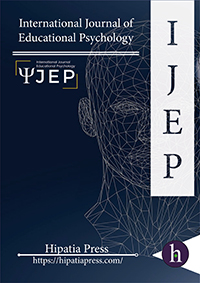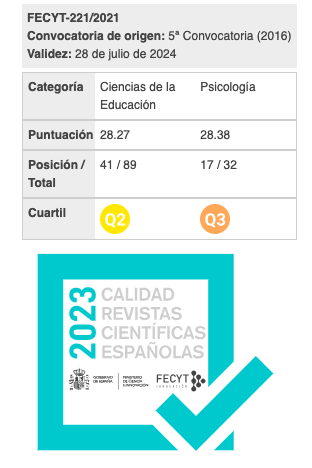Genetic Determinism on Teachers’ Perceptions about Etiology of Mental Disorders
Keywords:
Downloads
Abstract
Mental disorders are disorders of the cognitive, emotional or behavioral condition of an individual. They can have several origins and are usually associated with expressive anguish and difficulty in various aspects of life, including school education. Mental disorders are accompanied by social stigmas which may be linked to the belief in genetic determinism, i.e., in the perception that mental disorders are unchanging. The objective of the present study was to understand the perception of Brazilian teachers of all levels about the etiology of mental disorders. The results showed that most of the teachers studied believe in the predominance or exclusivity of genes in mental disorders, and do not consider the environment as a potential influencer of their occurrence or mitigation. This perception approaches the belief in genetic determinism and can justify the labeling of students with mental disorders and the consequent perpetuation of social stigmas. It is therefore recommended to promote knowledge in this area, including knowledge of the dynamics of interaction between genes and the environment, helping educators to prepare and to be able to act according to the reality of each student without creating inappropriate stereotypes.
Downloads
References
American Psychiatric Association. (2013). Diagnostic and Statistical Manual of Mental Disorders. Arlington. http://doi.org/10.1176/appi.books.9780890425596.744053
Google Scholar CrossrefAndrews, B., and Wilding, J. M. (2004). The relation of depression and anxiety to life‐stress and achievement in students. British Journal of Psychology, 95(4), 509-521. https://doi.org/10.1348/0007126042369802
Google Scholar CrossrefAntonelli-Ponti, M (2016). Percepção de professores sobre a influência genética e ambiental em comportamentos relevantes no processo educacional (Masters dissertation). Faculdade de Filosofia Ciências e Letras de Ribeirão Preto – Universityof São Paulo.
Google Scholar CrossrefAntonelli-Ponti, M., &Crosswaite, M. (2019). Teachers' perceptions about the etiology of intelligence and learning difficulties. International Journal of Educational Psychology, 8(2), 162-187. http://dx.doi.org/10.17583/ijep.2019.3777
Google Scholar CrossrefAntonelli-Ponti, Versuti and Da Silva (2018) Teachers’ perception about genes and behavior. Estudos de Psicologia Campinas, 35, 4. http://dx.doi.org/10.1590/1982-02752018000400009
Google Scholar CrossrefAsbury, K., and Plomin, R. (2013). G is for Genes: The impact of genes on education and achievement (Vol. 1). Wiley Blackwell. http://doi.org/10.1017/CBO9781107415324.004
Google Scholar CrossrefBriley, D. A., Livengood, J., Derringer, J., Tucker-Drob, E. M., Fraley, R. C., and Roberts, B. W. (2018). Interpreting Behavior Genetic Models: Seven Developmental Processes to Understand. Behavior genetics, 1-15.
Google Scholar CrossrefCastéra, J., and Clément, P. (2014). Teachers’ conceptions about the genetic determinism of human behaviour: a survey in 23 countries. Science and Education, 23(2), 417–443. http://doi.org/10.1007/s11191-012-9494-0
Google Scholar CrossrefCaspi, A., and Moffitt, T. E. (2018). All for one and one for all: Mental disorders in one dimension. American Journal of Psychiatry, 175(9), 831-844.
Google Scholar CrossrefCentre for Addiction and Mental Health (2001). Talking about Mental Disorder: A guide for developing an awareness program for youth. Teacher’s Resource. ISBN 0-88868-401-0. Canadá: Marketing and Sales Services
Google Scholar CrossrefCrosswaite, M., and Asbury, K. (2018). Teacher beliefs about the aetiology of individual differences in cognitive ability, and the relevance of behavioural genetics to education. British Journal of Educational Psychology. https://doi.org/10.1111/bjep.12224
Google Scholar CrossrefGericke, N., Carver, R., Castéra, J., Evangelista, N. A. M., Marre, C. C., and El-Hani, C. N. (2017). Exploring relationships among belief in genetic determinism, genetics knowledge, and social factors. Science and Education, 26(10), 1223–1259.https://doi.org/10.1007/s11191-017-9950-y
Google Scholar CrossrefHeine S.J., Dar-Nimrod I., Cheung B.Y. & Proulx, T. (2017). Essentially biased: Why people are fatalistic about genes. In: Olson JM (ed.) Advances in Experimental Social Psychology, 55. San Diego, CA: Elsevier. https://doi.org/10.1016/bs.aesp.2016.10.003
Google Scholar CrossrefHuman Genetics Commission. (2001). Public attitudes to human genetic information: People’s Panel quantitative study conducted for the Human Genetics Commission.
Google Scholar CrossrefKe, S., Lai, J., Sun, T., Yang, M. M., Wang, J. C. C., and Austin, J, (2014). Healthy young minds: the effects of a 1-hour classroom workshop on mental disorder stigma in high school students. Community mental health journal, 51(3), 329-337.
Google Scholar CrossrefLopes, C. S., Abreu, G. D. A., Santos, D. F. D., Menezes, P. R., Carvalho, K. M. B. D., Cunha, C. D. F., ... and Szklo, M. (2016). ERICA: prevalência de transtornos mentais comuns em adolescentes brasileiros. Rev. Saúde Pública, 50(suppl 1). doi:10.1590/S01518-8787.2016050006690
Google Scholar CrossrefMorgado, A. F., and Coutinho, E. S. F. (1985). Dados de epidemiologia descritiva de transtornos mentais em grupos populacionais do Brasil. Cadernos de Saúde Pública, 1(3), 327-347. https://dx.doi.org/10.1590/S0102-311X1985000300006
Google Scholar CrossrefNestler, E. J., Peña, C. J., Kundakovic, M., Mitchell, A., andAkbarian, S. (2016). Epigenetic basis of mental disorder. The Neuroscientist, 22(5), 447-463. doi: 10.1177/1073858415608147
Google Scholar CrossrefPlomin, R., Defries, J. C., McClearn, G. E., and McGuffin, P. (2011). Genética do Comportamento (5o Edição). São Paulo: Artmed.
Google Scholar CrossrefPlomin, R., DeFries, J. C., Knopik, V. S., andNeiderhiser, J. M. (2016). Top 10 replicated findings from behavioral genetics. Perspectives on Psychological Science, 11(1), 3-23.https://doi.org/10.1177/1745691615617439
Google Scholar CrossrefPonti, M., Tokumaru, R. S., Monticelli, P. F., Vilaça, T. & Costa, P. (2020). Development and Validity Evidence of the Teaching Practice Perception Scale. Revista Psicologia em Pesquisa, 14, 1. https://doi.org/10.34019/1982-1247.2020.v14.29037
Google Scholar CrossrefSelzam, S., Coleman, J. R., Caspi, A., Moffitt, T. E., and Plomin, R. (2018). A polygenic p factor for major psychiatric disorders. Translational psychiatry, 8(1), 205.
Google Scholar CrossrefSoares, A. G. S., Estanislau, G., Brietzke, E., Lefèvre, F., and Bressan, R. A. (2014). Public school teachers’ perceptions about mental health. Revista de Saúde Pública, 48(6), 940–948. http://doi.org/10.1590/S0034-8910.2014048004696
Google Scholar CrossrefSoares, I. F., and Bejarano, N. R. (2009). Crenças dos professores e formação docente. Revista entreideias: educação, cultura e sociedade, 13(14).
Google Scholar CrossrefSpearman, C. (1904). “General intelligence,” objectively determined and
Google Scholar Crossrefmeasured. American Journal of Psychology, 15, 201–292.
Google Scholar CrossrefUher, R., and Zwicker, A. (2017). Etiology in psychiatry: embracing the reality of poly‐gene‐environmental causation of mental disorder. World Psychiatry, 16(2), 121-129.
Google Scholar CrossrefWalker, S. O., and Plomin, R. (2005). The Nature–Nurture Question: Teachers’ perceptions of how genes and the environment influence educationally relevant behaviour. Educational Psychology, 25(5), 509–516. http://doi.org/10.1080/01443410500046697
Google Scholar CrossrefWehmeyer, M. L., Agran, M., and Hughes, C. (2000). A National Survey of Teachers’ Promotion of Self-Determination and Student-Directed Learning. The Journal of Special Education, 34(2), 58–68. http://doi.org/10.1177/002246690003400201
Google Scholar CrossrefWerlen, L., Gjukaj, D., Mohler-Kuo, M., &Puhan, M. A. (2020). Interventions to improve children's access to mental health care: a systematic review and meta-analysis. Epidemiology and Psychiatric Sciences, 29. https://doi.org/10.1017/ S204579601900054
Google Scholar CrossrefDownloads
Published
Almetric
Dimensions
How to Cite
Issue
Section
License
Copyright (c) 2021 Mayra Antonelli-Ponti, Patrícia Ferreira Monticelli, José Aparecido da Silva

This work is licensed under a Creative Commons Attribution 4.0 International License.
All articles are published under Creative Commons copyright (CC BY). Authors hold the copyright and retain publishing rights without restrictions, but authors allow anyone to download, reuse, reprint, modify, distribute, and/or copy articles as the original source is cited.
















